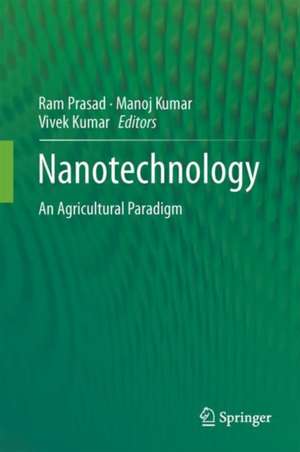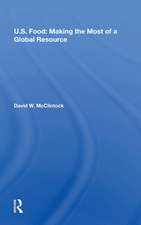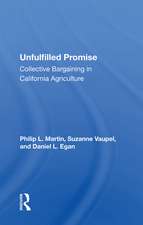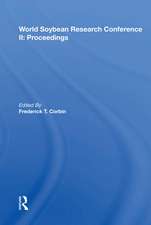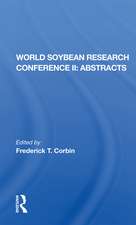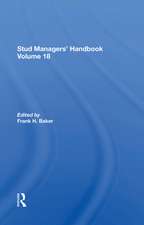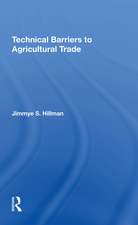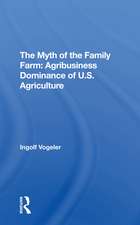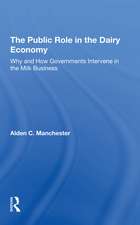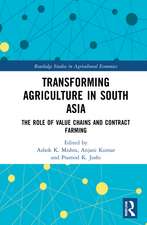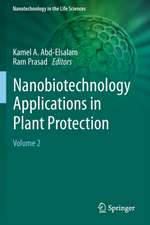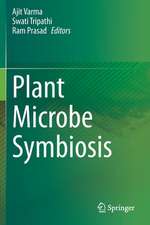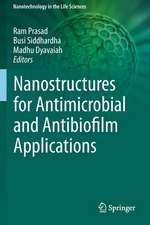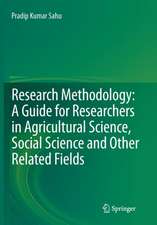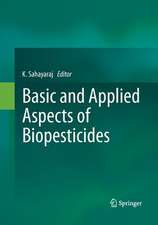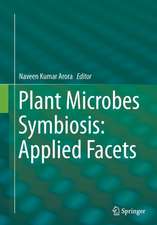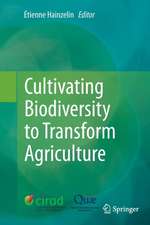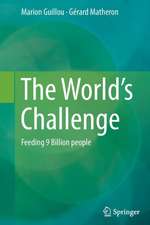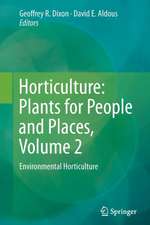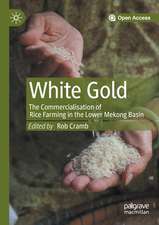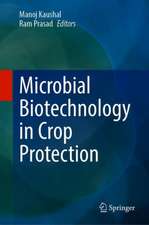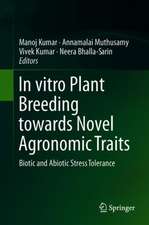Nanotechnology: An Agricultural Paradigm
Editat de Ram Prasad, Manoj Kumar, Vivek Kumaren Limba Engleză Hardback – 27 iun 2017
Nanomaterials in agriculture reduce the amount of chemical products sprayed by means of smart delivery of active ingredients; minimize nutrient losses in fertilization; and increase yields through optimized water and nutrient management. There is also huge potential for nanotechnology in the provision of state-of-the-art solutions for various challenges faced by agriculture and society, both today and in the future.
| Toate formatele și edițiile | Preț | Express |
|---|---|---|
| Paperback (2) | 788.72 lei 38-45 zile | |
| Springer Nature Singapore – 13 dec 2018 | 788.72 lei 38-45 zile | |
| Springer Nature Singapore – 12 dec 2018 | 942.09 lei 38-45 zile | |
| Hardback (2) | 955.88 lei 3-5 săpt. | |
| Springer Nature Singapore – 22 sep 2017 | 955.88 lei 3-5 săpt. | |
| Springer Nature Singapore – 27 iun 2017 | 1120.18 lei 3-5 săpt. |
Preț: 1120.18 lei
Preț vechi: 1366.08 lei
-18% Nou
Puncte Express: 1680
Preț estimativ în valută:
214.34€ • 223.79$ • 177.40£
214.34€ • 223.79$ • 177.40£
Carte disponibilă
Livrare economică 14-28 martie
Preluare comenzi: 021 569.72.76
Specificații
ISBN-13: 9789811045721
ISBN-10: 9811045720
Pagini: 371
Ilustrații: VIII, 371 p. 48 illus., 36 illus. in color.
Dimensiuni: 155 x 235 mm
Greutate: 0.77 kg
Ediția:1st ed. 2017
Editura: Springer Nature Singapore
Colecția Springer
Locul publicării:Singapore, Singapore
ISBN-10: 9811045720
Pagini: 371
Ilustrații: VIII, 371 p. 48 illus., 36 illus. in color.
Dimensiuni: 155 x 235 mm
Greutate: 0.77 kg
Ediția:1st ed. 2017
Editura: Springer Nature Singapore
Colecția Springer
Locul publicării:Singapore, Singapore
Cuprins
Chapter 1. Production of Cellulose Nanofibrils and its Application to Food: A Review.- Chapter 2. Nanotechnology and Shelf-life of Animal Foods.- Chapter 3. Nanotechnology: Meat Safety Revolution.- Chapter4. Marine Nanofactories in Food.- Industry: Friend or Foe.- Chapter 5. Revolutionizing the Food Supply Chain in the United States: The Impact of Nanotechnology.- Chapter 6. Nanotechnology in Packaging Industry and Its Food Packaging Applications.- Chapter 7. Nanobiosensors, as a Next Generation Diagnostic Device for Quality & Safety of Food and Dairy Product.- Chapter 8. Nano Molecular Imprinted Polymers (NanoMIPs) for Food Diagnostics and Sensor.- Chapter 9. Nanotechnology Applications in Food Industry.- Chapter 10. Impact of the Nanomaterials on Soil Bacterial Biodiversity.- Chapter 11. The Impact of Engineered Nanomaterials on Crops and Soil Microorganisms.- Chapter 12. Advancement of Nanotechnology Applications on Plant Nutrients Management and SoilImprovement.- Chapter 13. Biosynthesis of Nanoparticles and their Application in Pharmaceutical Industry.- Chapter 14. Nanomaterials acts as Plant Defense Mechanism.- Chapter 15. Phytoengineered Nanomaterials and Their Applications.- Chapter 16. Plants and Carbon Nanotubes (CNT) Interface: Present Status and Future Prospects.
Notă biografică
Dr. Ram Prasad is Assistant Professor at the Amity Institute of Microbial Technology, Amity University, Uttar Pradesh, India. His research interest includes plant-microbe-interactions, sustainable agriculture and microbial nanobiotechnology. Dr. Prasad has more than hundred publications to his credit, including research papers & book chapters and five patents issued or pending, and edited or authored several books. Dr. Prasad has eleven years of teaching experience and he has been awarded the Young Scientist Award (2007) and Prof. J.S. Datta Munshi Gold Medal (2009) by the International Society for Ecological Communications; FSAB fellowship (2010) by the Society for Applied Biotechnology; Outstanding Scientist Award (2015) in the field of Microbiology by Venus International Foundation; and the American Cancer Society UICC International Fellowship for Beginning Investigators (USA, 2014). In 2014-2015, Dr. Prasad served as Visiting Assistant Professor in the Department ofMechanical Engineering at Johns Hopkins University, USA.
Dr. Vivek Kumar is a scientist with involved in teaching, research and guidance, with a pledge to enduring knowledge. Dr. Kumar is working in the Institute of Microbial Technology at Amity University Uttar Pradesh, Noida, India. He obtained his masters and doctoral degree from CCS Haryana Agricultural University, Hisar, Haryana, India. He is serving in Editorial board of reputed international journals viz. Environment Asia, International Journal of Biological & Chemical Sciences, Journal of Advanced Botany and Zoology, Journal of Ecobiotechnology. He is also reviewer of Journal of Hazardous Materials, Science International, Acta Physiologiae Plantarum, Int. Research Journal of Plant Sciences, Int. J.Microbiology, African J Microbiology Research, Journal of Microbiology and Antimicrobials, Environment Science & Pollution Research, Rhizosphere. He has published 61 research papers, 19 book chapters, six review articles and two books. Dr. Kumar has also served as Microbiologist for eight years in Department of Soil and Water Research, Public Authority of Agricultural Affairs & Fish Resources, Kuwait. Dr. Kumar has organized number of conferences/workshops as convener/ organizing secretary.
Textul de pe ultima copertă
This book highlights the implications of nanotechnology and the effects of nanoparticles on agricultural systems, their interactions with plants as well as their potential applications as fertilizers and pesticides. It also discusses how innovative, eco-friendly approaches to improve food and agricultural systems lead to increased plant productivity. Further, it offers insights into the current trends and future prospects of nanotechnology along with the benefits and risks and their impact on agricultural ecosystems.
Nanomaterials in agriculture reduce the amount of chemical products sprayed by means of smart delivery of active ingredients; minimize nutrient losses in fertilization; and increase yields through optimized water and nutrient management. There is also huge potential for nanotechnology in the provision of state-of-the-art solutions for various challenges faced by agriculture and society, both today and in the future.
Nanomaterials in agriculture reduce the amount of chemical products sprayed by means of smart delivery of active ingredients; minimize nutrient losses in fertilization; and increase yields through optimized water and nutrient management. There is also huge potential for nanotechnology in the provision of state-of-the-art solutions for various challenges faced by agriculture and society, both today and in the future.
Caracteristici
Explains the novel properties of nanomaterials in agriculture Provides a holistic view on the role of nano-agriculture in food security and environmental protection Describes nanotechnology as a promising way to improve crop production, water quality, nutrition, packaging, and food security
